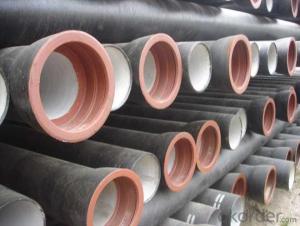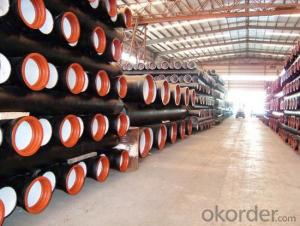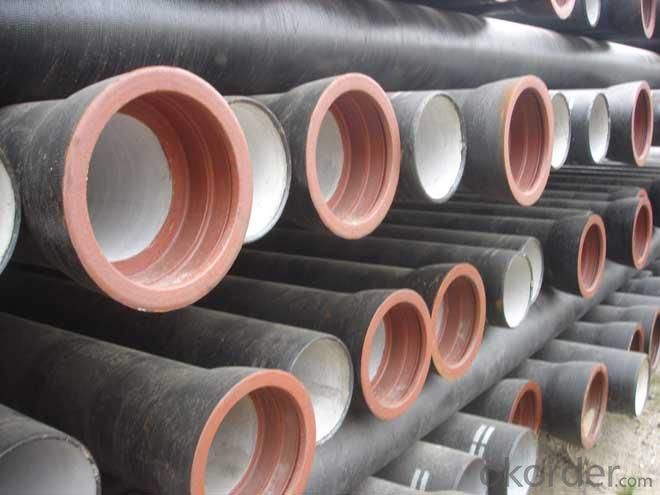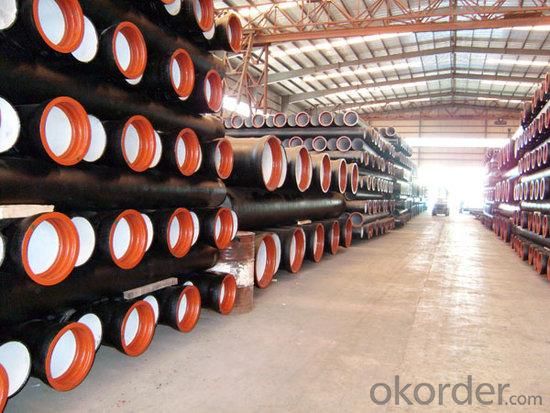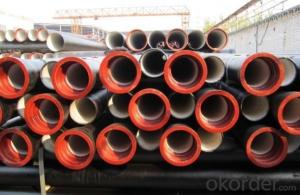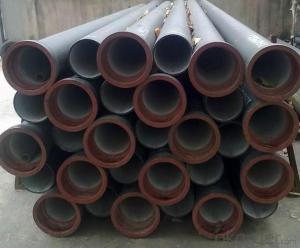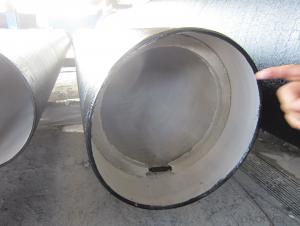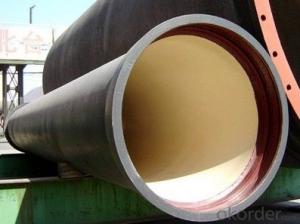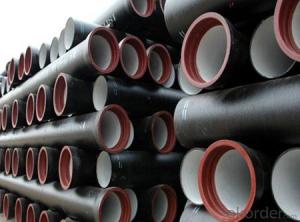Ductile Iron Pipe of China DN900 EN598 On Sale
- Loading Port:
- China main port
- Payment Terms:
- TT or LC
- Min Order Qty:
- 20 m.t.
- Supply Capability:
- 100000 m.t./month
OKorder Service Pledge
OKorder Financial Service
You Might Also Like
1,Ductile Iron Pipe Description :
1) Pipes confirm to ISO2531,K9 class,T type joint,6m long,with inside cements lining conform to ISO4179, outside Zinc spraying(130g/m2) and bitumen coating(70μm) conform to ISO8179.
2) Pipe ends: Spigot and socket ends, with 100% SBR rubber gaskets accoding to ISO4633
3) we can do third party inspection according to customer's request.
2,Main Features of the Ductile Iron Pipe:
•High yield strength
•High tensile Strength
•High corrosion resistance
•Pressure Resistence
•Satisfy the highest hygienic standards
3,Ductile Iron Pipe Images:
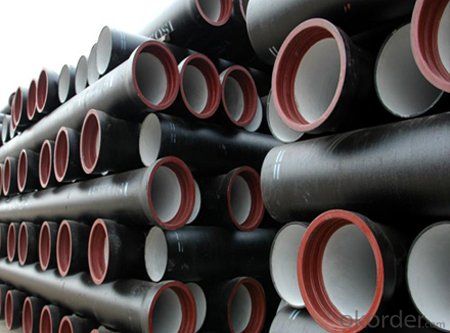
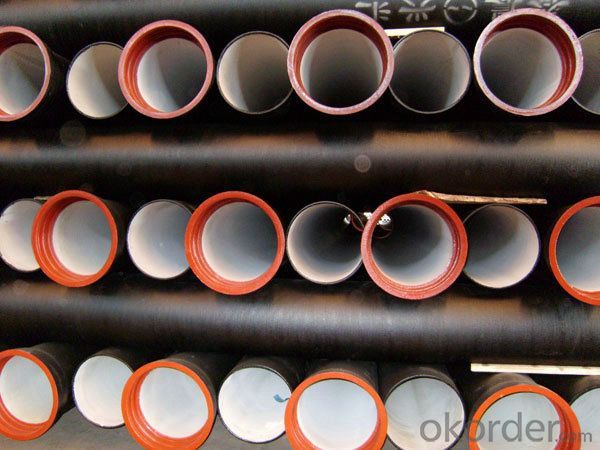
4. Ductile Iron Pipe Specification:
Surface Finishes: Bare, Oiled, Mill Varnish, Galv,FBE, FBE Dual, 3LPE, 3LPP, Coal Tar,Concrete Coating and Tape Wrap
End Finishes: Beveled, Square Cut, Threaded, hat
Additional Services: Internal Coating
Packaging: packed in bag, plastic bag, steel strip, steel wire,double wire, iron box, wooden box, tarpaulin, plastic sheeting
Test: X-ray, UT, magnetic particle,inspection,hydrostatic test.
Processing service: Beveling, Threading, Slotting, Cut-to length, Bends, Quench and Temper, Fabrication, Double-jointing and On-site assistance
5.FAQ:
We have organized several common questions for our clients,may help you sincerely:
1.Q: Why would you choose ductile iron pipe rather than other pipe materials?
A:The reasons are obvious for that not only ductile iron pipe possesses the inherent strength and flexibility of ductile iron, combined with proven corrosion protection systems, but also the cost savings can be achieved from design to installation and commissioning.
2.Q:Why can you guarantee the inner of pipes can’t be corroded?
A: High alumina cement mortar lining and sulphate-resistant cement mortar lining. These two special linings are applicable to inner anti-corrosion for sewage pipes, improving resistance to erosion of the sewage components.
- Q: Can ductile iron pipes be used in high-pressure applications?
- Yes, ductile iron pipes can be used in high-pressure applications. Ductile iron pipes are known for their strength and durability, making them suitable for handling high-pressure fluids or gases. They have a higher pressure rating compared to other types of pipes, such as PVC or HDPE pipes. Ductile iron pipes also have excellent resistance to external loads and are capable of withstanding high internal pressures. These pipes are commonly used in water and wastewater systems, as well as in industrial applications where high-pressure conditions are present. It is important, however, to ensure that the ductile iron pipes used in high-pressure applications meet the required standards and specifications to ensure their safe and reliable operation.
- Q: Are ductile iron pipes suitable for irrigation systems?
- Yes, ductile iron pipes are suitable for irrigation systems. They are known for their strength, durability, and corrosion resistance, making them a reliable choice for transporting water in agricultural settings. Additionally, ductile iron pipes can withstand high pressure and are resistant to external loadings, making them ideal for irrigation systems that require efficient water distribution.
- Q: Can ductile iron pipes be used for seawater intake systems?
- Seawater intake systems can utilize ductile iron pipes, which are a type of cast iron renowned for their strength, durability, and corrosion resistance. These properties render them suitable for various applications, including seawater intake systems. The high salt content of seawater makes it highly corrosive, posing a threat to regular cast iron pipes that may suffer from corrosion and damage over time. However, ductile iron pipes possess a protective coating acting as a corrosion barrier, enabling them to endure the harsh conditions of seawater. Furthermore, compared to regular cast iron pipes, ductile iron pipes exhibit superior tensile strength, enhancing their resistance to the intense pressures and stresses associated with seawater intake systems. As a result, ductile iron pipes offer a dependable and cost-effective option for seawater intake systems.
- Q: Maximum pipe diameter of ductile iron pipe
- The maximum diameter of ball milling cast iron pipe can be DN3000.. For long pressure pipeline, the performance of ball milling cast iron pipe is better than that of PCCP tube, and the performance is reliable, safe and stable!
- Q: The difference between cast iron pipe and ductile iron pipe
- Ductile iron is based on the cast iron to change some of the characteristics of the structure of iron, so that it has become a lot of toughness, than the cast iron pipe is too brittle shortcomings much better, the tensile strength of the pipe bending strength greatly improved. The sealing material used in the socket interface is rubber ring.
- Q: Can ductile iron pipe be used for irrigation pumping stations?
- Yes, ductile iron pipe can be used for irrigation pumping stations. Ductile iron pipe is commonly used in various applications, including irrigation systems, due to its durability and strength. It has high tensile strength and can withstand high pressure and heavy loads, making it suitable for irrigation pumping stations. Additionally, ductile iron pipe is resistant to corrosion, which is beneficial in irrigation systems where water is present. It is also easy to install and maintain, making it a cost-effective choice for irrigation projects.
- Q: Are ductile iron pipes suitable for use in cooling water systems?
- Ductile iron pipes are indeed appropriate for utilization in cooling water systems. They exhibit remarkable strength and durability, rendering them impervious to the intense pressure and corrosive properties inherent in such systems. Furthermore, they possess the ability to withstand extreme fluctuations in temperature while delivering enduring performance. Additionally, ductile iron pipes exhibit commendable resistance to the proliferation of microorganisms, a crucial aspect in preserving the quality of the cooling water. Moreover, these pipes facilitate effortless installation and necessitate minimal maintenance, thereby constituting a cost-effective alternative for cooling water systems. In summary, ductile iron pipes represent a dependable and suitable choice for employment in cooling water systems.
- Q: How to analyze and judge the quality of ductile iron pipe
- The quality of water supply pipe ductile is a topic worthy of discussion, how to judge the quality of the ductile iron pipe, ductile now on the market is all kinds of pipe, a name sand type ductile iron pipe, ductile water-cooling tube, K8 grade K9 grade ductile iron pipe, ductile iron pipe, also the brand is divided into ductile ductile pipe pipe, big brands, and some well-known manufacturers of producing ductile pipe,
- Q: How are ductile iron pipes protected against stray electrical currents?
- To safeguard water and sewer systems, ductile iron pipes are shielded from stray electrical currents through a technique called cathodic protection. This process entails the application of a low-voltage direct current (DC) to the pipes, generating a defensive electrical field around them. To achieve cathodic protection, sacrificial anodes or impressed current systems are installed near the ductile iron pipes. Sacrificial anodes, composed of a more electrically active metal like zinc or magnesium, are connected to the pipes and act as the electrical current source. Over time, these anodes corrode, sacrificing themselves to shield the pipes from corrosion caused by stray electrical currents. However, impressed current systems utilize an external power source to supply the protective electrical current. Rectifiers are employed to convert alternating current (AC) to direct current (DC), which is then administered to the pipes through anodes. This approach provides greater control over the amount of current applied, ensuring optimal protection. In both scenarios, the electrical current flowing through the sacrificial anodes or impressed current systems establishes a protective barrier around the ductile iron pipes. This barrier impedes the flow of stray electrical currents through the pipes, thus diminishing the risk of corrosion and prolonging the infrastructure's lifespan. Regular monitoring and maintenance of the cathodic protection system are crucial to uphold its efficacy. This involves inspecting the anodes, assessing the levels of electrical current, and making any necessary adjustments or replacements to maintain the desired level of protection. To summarize, cathodic protection is a dependable and widely utilized method for safeguarding ductile iron pipes against stray electrical currents. By preserving the integrity and longevity of water and sewer systems, it plays a vital role in ensuring their functionality.
- Q: Can ductile iron pipe be used for stormwater management systems?
- Ductile iron pipe is indeed suitable for stormwater management systems. It finds extensive use in diverse applications, such as stormwater drainage systems. Its exceptional attributes encompass robustness, longevity, and resistance against corrosion, rendering it highly capable of enduring the challenging conditions inherent in stormwater management. Furthermore, the installation and maintenance of ductile iron pipe are effortless, thus making it a cost-efficient selection for stormwater management systems. In summary, ductile iron pipe emerges as a dependable and fitting alternative for the construction of stormwater management systems.
Send your message to us
Ductile Iron Pipe of China DN900 EN598 On Sale
- Loading Port:
- China main port
- Payment Terms:
- TT or LC
- Min Order Qty:
- 20 m.t.
- Supply Capability:
- 100000 m.t./month
OKorder Service Pledge
OKorder Financial Service
Similar products
Hot products
Hot Searches
Related keywords
